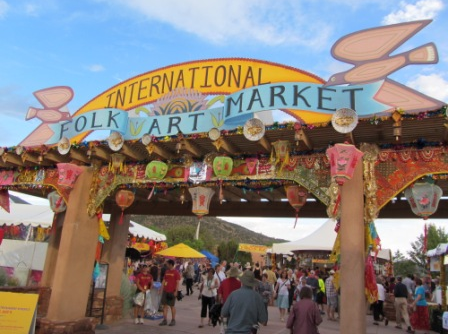I am flying home from Santa Fe, and kinda proud of myself. Before the Santa Fe International Folk Art Market, I had firmly promised myself that I would not, repeat, not, buy any more handmade artisan crafts. I have no, repeat, no, more room for anything in either my home or office.
The good news is I only bought four art objects: a carved wooden puffin (it is so cute!), a hand-painted metal chicken for the kitchen, a Cuban painting (really, it is very small), a mask from Costa Rica and a ceramic Noah's Ark from Peru. OK, OK, five items.
Oh, wait, I also purchased a traditional Nepalese wedding festival painting from the Janakpur Women's Development Center which, besides maintaining this artistic tradition, provides training in literary, leadership, business skills and gender awareness. So, six items.
The Folk Art Market 
Photo: Jonathan C. Lewis
I am home now and don't have a clue where to display my new acquisitions. I love each one of them.
And, yes, I have helped an artist in a distant land feed his or her family, sustained in a small way an artistic and cultural heritage and voted with my consumer dollars against mass-produced products churned out by underpaid workers in the developing world.
"The art of the craftsman is a bond between the peoples of the world," declared Florence Dibell Bartlett, founder Santa Fe's Museum of International Folk Art.
The Museum of International Folk is one of my very favorite museums. Home to the world's largest collection of folk art, the more than 135,000 artifacts are elegant, playful, poignant, human-scale and zestful.
If you can't make it to Santa Fe, a terrific choice is right there on your computer. Click on a pioneering online marketplace called MyMela.
Founded this year by Opportunity Collaboration Delegate Sonali Mehta-Rao and her father Navroze Mehta (let's hear it for father-daughter teams!), hear Sonali describe MyMela's two-pronged approach:
"Our business model is thinking two steps ahead. We are not alone in our belief that underprivileged artisans benefit from access to U.S. consumers, and U.S. consumers benefit from access to high-quality artisan products at a great value."
"What makes MyMela truly unique is the opportunity to connect with our artisans in a more direct way. It is important to think about the needs of the artisans if and when we are successful in creating increased demand. They will need to buy more supplies, hire more people, grow their business. In order to do that, they need access to affordable business capital. Most of these artisans are currently gouged by local moneylenders who charge exorbitant interest rates."
"Using our site, an American consumer is empowered to actively participate in the development of the artisan's business by contributing funds to the very producers that he/she is buying from. The consumer is repaid ("compensated") in the form of shopping credits, stimulating further demand. We are creating the demand for products and also providing the support necessary to sustainably grow to meet that demand."
At this year's Opportunity Collaboration, I may propose a new international aid organization: Shoppers without Borders.
